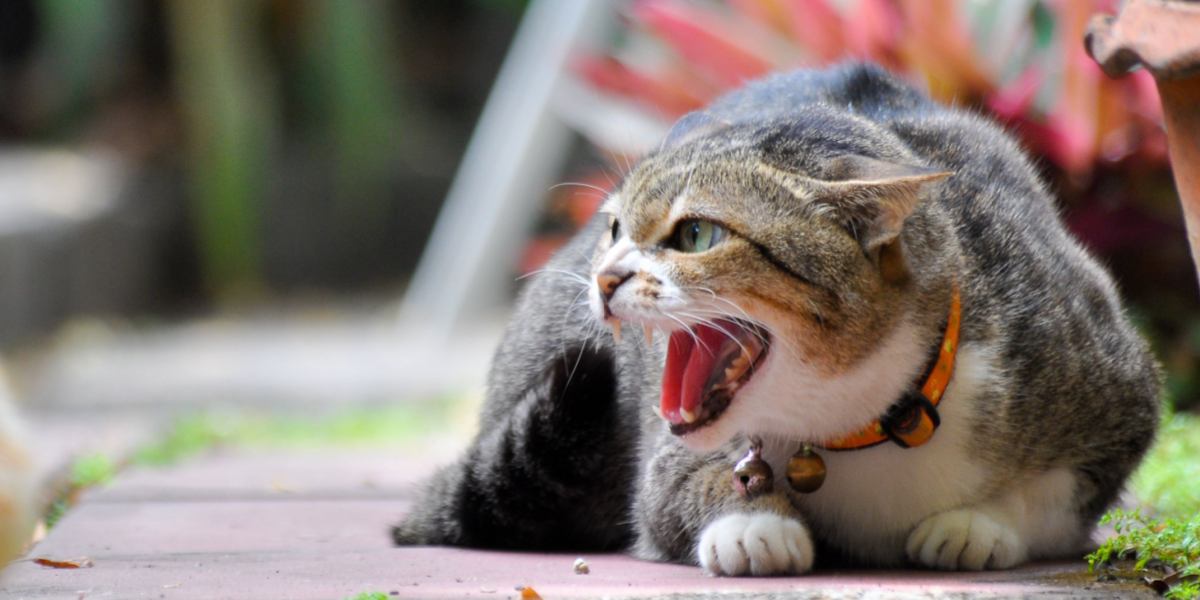
There are many ways that cats communicate and vocalizing is one of them. This can include familiar cat sounds such as meowing, purring, and hissing but also more distressing sounds like howling.
Have you heard your cat howling before? Howling is a distinctive sound and our feline companions can do this for a variety of reasons to communicate with us or other cats.
What Is Howling?
Howling is a distinctive vocalization that cats can make. I’m sure many of you have heard it before. You might have heard it when cats are fighting during the night or during the mating season.
It’s sometimes referred to as “yowling” or “caterwauling,” and it sounds like a louder, deeper, continuous meow. Depending on why the cat is making this sound, it can sometimes carry with it a sense of urgency and make us feel as if our cat is in pain or distress.
Why Do Cats Howl?
Now that we know what howling sounds like, why is it that cats howl? There are many reasons for this, some of them are harmless reasons that are easily fixed and others are more serious.
Either way, if your cat has suddenly started to howl, they’re trying to tell you something. It’s important to find out why your cat is howling so that you can help them.
6 Reasons for Howling in Cats
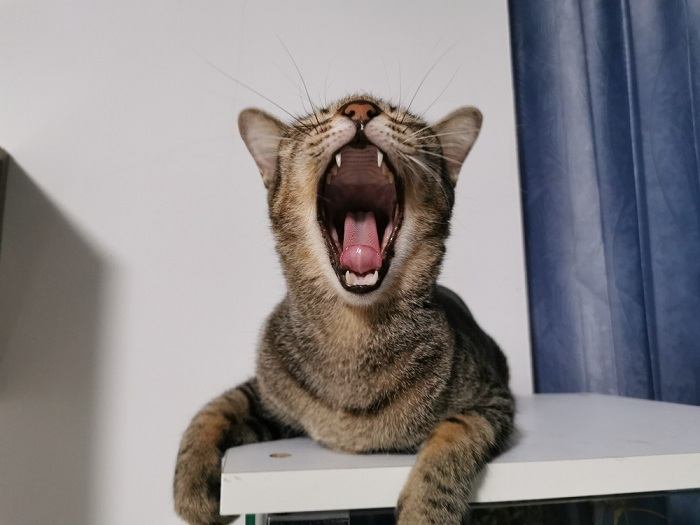
If your cat starts howling suddenly or persistently, take them into the vet for a thorough checkup.
Cats can howl if they’re in pain, distressed, bored, or due to certain medical conditions. We’ll discuss these reasons further below.
1. Hormonal
Cats that aren’t spayed or neutered (castrated) can often be heard howling or yowling during the mating season. This can be because they’re trying to find a mate by howling and calling out to other cats. They can also howl when fighting with other cats and this happens a lot during the mating season (e.g., males competing against each other for females).
2. Territorial
Cats don’t like it when other cats trespass into their home or territory and this can cause a variety of vocalizations, including hissing, growling, and howling, to make their displeasure known to the other cat.
3. Hunting Behavior
Cats are crepuscular creatures, meaning that they’re most active at dusk and dawn and this is their favorite time to hunt. Cats that are kept indoors at night might start howling during the early hours to be let outside to hunt. Hunting is a normal behavior to display, even in our pet cats.
4. Boredom
Cats that are inactive or under stimulated, might become bored and restless. This can cause a variety of behaviors including cat meowing, howling, or yowling and attention-seeking behavior.
5. Stress
Cats that are suffering from any form of stress might vocalize more. This might include excessive meowing or howling along with other changes in behavior. Stress can come in many forms for cats, such as a new baby in the house, a change of work schedule, conflict with another cat, or if they are experiencing pain or discomfort.
6. Medical Reasons
Any cat that is in pain or discomfort may howl or meow loudly to convey this, so it’s extremely important to check for any signs of injury. If your cat is older, it could be a sign of a chronic medical condition.
Conditions like hyperthyroidism (an overactive thyroid) and hypertension (high blood pressure) can cause howling in older cats. This can occur at any time of day or just be at night time (common with hypertension).
Another medical reason that might cause this is cognitive dysfunction syndrome. This can occur in elderly cats and is similar to dementia in humans. It can cause disorientation, confusion, changes in social interaction and changes in their sleeping routine.
Cats that are deaf might meow or howl loudly because they can’t hear themselves. Certain breeds are more vocal and chatty than others. Siamese cats are famous for their loud meows, which may sound like howling when the cat is trying to get your attention.
What Should You Do if Your Cat Is Howling?
If your cat is howling, it’s likely that they’re trying to communicate with you and it’s important to know why and how to solve the issue.
Some things you can do to rule out common causes include:
- Check for injuries and causes of pain.
- Visit your vet to rule out medical causes.
- Neutering will solve the problem if your cat isn’t neutered and the howling is hormonal.
- Ensure that your cat has enough food, water, clean litter box (one per cat, plus one more) and places to sleep (resources).
- Address any underlying stress by using pheromone diffusers, separating resources for cats, etc.
- Allowing cats to have access outdoors if they wish through a cat flap during the night to prevent howling at dawn (crepuscular activity). If they’re indoors only or kept indoors at night, you can provide lots of toys that allow them to demonstrate hunting behavior.
- If your cat is bored, provide lots of interactive toys and an interactive or automatic feeder to keep them occupied. Provide consistent, positive human interaction and consider the use of a pet sitter if you’re away a lot.
When Should You Visit Your Vet?
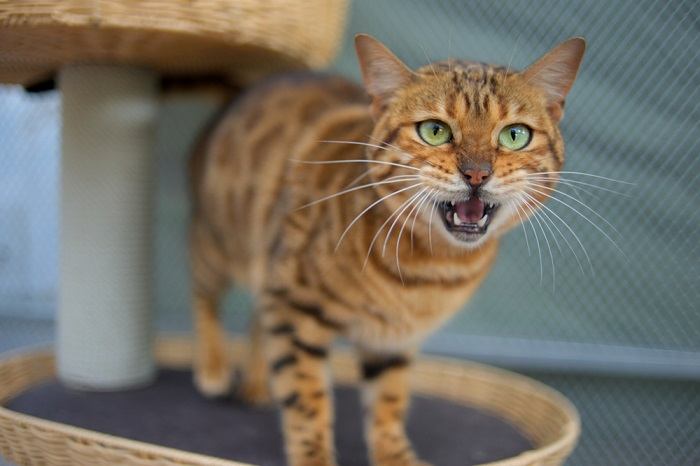
If your cat is howling, try to find out if something is causing stress, pain, or discomfort.
If your cat is howling for no apparent reason, especially if it’s a new behavior, you should see your veterinarian so that they can rule out common causes of injury and pain.
Senior cats are particularly prone to high blood pressure, an overactive thyroid, kidney disease, and cognitive dysfunction (dementia).
Your vet will take a full history and examine your cat; they might decide to carry out some blood and urine testing to check for the conditions mentioned above. Diagnosing these conditions earlier can improve the long term prognosis for your cat so always seek veterinary attention if you’re concerned.
What Not To Do
Your cat isn’t howling to “annoy” you or wake you up at night, they’re howling as a form of communication. Never punish your cat for this behavior—they aren’t doing this maliciously and it’s likely that they’ll just become fearful of you, which will make the problem worse.
If you’re not sure why your cat is howling or if it’s accompanied by other symptoms, it’s important to get your cat checked by a veterinarian. Never ignore a change of behavior as it could be a sign of an underlying problem.
Frequently Asked Questions
What does it mean when a cat is howling?
Howling is a form of cat communication and it sounds like a loud, deep meowing that carries on longer than a normal meow. It can often sound quite urgent and distressing.
Why is my cat howling for no reason?
Cats can howl for many different reasons and it’s important to figure out why. It might because they’re unneutered, bored, stressed, or suffering from a medical condition. If you’re not sure why your cat is howling, contact your veterinarian to schedule a checkup.
What should I do if my cat is yowling?
If your cat is yowling or howling, they’re trying to communicate. Check for any signs of injury, pain or obvious stress. If they’re not neutered, consider getting this done. If there’s no obvious reason for the howling, schedule a checkup with your veterinarian to rule out medical issues.

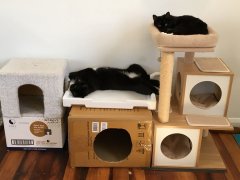

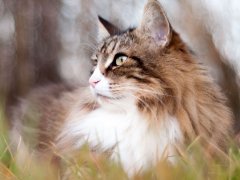
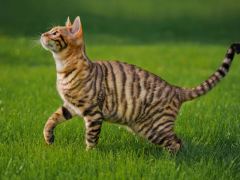



My cat was noisy when I first rescued him almost 3 years ago. However since I have become more imobile, he has got louder and annoys the other cat. It is hard to tolerate, but I am holding on in there for vetenary advice